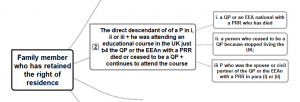Retained Rights of Residence for Children of EEA Nationals: Let me start with explaining what the legal term ‘retained right residence’ mean. Broadly speaking, all rights of residence of family members of EEA nationals depend on their EEA national family member. This means that if an EEA national decides to go back to his country of origin, his family member will automatically lose his right to remain in the UK. In the majority of cases, this family member will have to have to leave the country together with his EEA national member. That is unless this family member can claim that he or she has a retained rights of residence in the UK.
In my previous two blog posts and videos I’ve given you an overview of all four major categories of people who can claim that they have retained their rights of residence. Also I’ve explained and have given an example for the 1st category, where the EEA national family member has died.
In today’s blog post and video I’ll concentrate on the second category of family members who can claim that they have retained their rights of residence in the UK.
First of all this category is not only about children. It also relates to grandchildren and great-grandchildren of the relevant EEA national.
As you have probably guessed already from the title of this blog post, there are two possible case scenarios: 1. Where the EEA national died; 2. Where the EEA national has left the country;
As with all other categories, you will need to meet certain requirements in order to succeed in your retained rights of residence application:
The Requirements:
- You will need to prove that you are a direct descendant (a child, grandchild or great-grandchild) or an EEA national, who 4
- either died or
- left the UK;
- or you are a direct descendant of a spouse or a civil partner of the EEA national who died or left the UK
AND
- that EEA national was a qualified person (was working or was self-employed or a student or a self-sufficient person);
- you were attending an educational course in the UK immediately before the relevant EEA national died or left the country and you continue to attend such a course.
Remember, nursery is not included in the definition of an education course. The child will lose his right to remain in the UK as soon as s/he finishes his course.
OK, let me give you an example:
Let say Pedro is a national of Portugal and came to this country together with his non-EEA national wife Anna and her daughter Melissa. Melissa is also a visa-national, because she is not Pedro’s daughter, she is Anna’s daughter from previous marriage. Melissa is 7 years old. She attends primary school in the UK. After working in the UK for several years, Pedro decides to go back to Portugal. However Anna does not want to leave the UK before Melissa finishes her education.
The question is: ‘Will Melissa be allowed to remain in the UK on the basis of her retained rights of residence?’
Let us analyse this case scenario together:
- Melissa is a direct descendant of a spouse of the EEA national who left the UK. Melissa clearly meets this requirement.
- Pedro was a qualified person before leaving the UK. We know that he was. So, Melissa also meets this requirement.
- And finally, Melissa needs prove that she was attending an educational course in the UK. She needs to prove that she did so immediately before the relevant EEA national left the country. Melissa studies at one of primary schools in the UK, so this requirement is also met.
So, it looks like Melissa meets all these requirements. She is therefore quite likely to succeed in her retained right of residence application.

